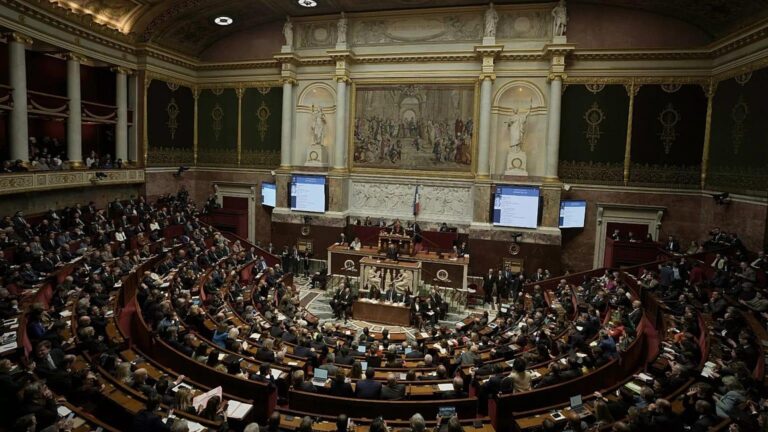Title: The Implications of Political Upheaval in France for the European Union
As France grapples with significant political turmoil, the ramifications extend far beyond its borders, posing challenges and uncertainties for the European Union. With protests erupting and public sentiment shifting, the stability of one of the EU’s founding members is called into question. This upheaval not only threatens France’s internal cohesion but also raises critical concerns about the EU’s collective strength, unity, and future policy direction. As policymakers in Brussels closely monitor the situation, the repercussions of France’s political landscape could reshape the continent’s approach to pressing issues such as migration, economic policy, and defense strategy. In this article, we explore the potential consequences for the EU and what this turmoil could mean for its future stability and integration.
Political Instability in France and Its Ripple Effects on EU Governance
The ongoing political unrest in France has significant implications for the broader governance and stability of the European Union. As one of the EUŌĆÖs founding members and a leading economic power, France’s internal challenges can disrupt the consensus-building essential for effective EU policymaking. The fragmentation of political parties and rising populism may lead to a gridlock in policy decisions, which could stall crucial reforms across various sectors including climate policy, economic recovery initiatives, and migration. This situation could leave member states grappling with uncertainties and inconsistencies in policy application, making unified approaches increasingly difficult.
Additionally, the ripple effects of FranceŌĆÖs instability may be felt in the EUŌĆÖs foreign relations. The inability of the French government to present a cohesive stance may weaken its influence in international negotiations, affecting issues such as trade agreements and security pacts. The key consequences include:
- Decreased Influence: A weakened France may lead to diminished EU presence on the global stage.
- Policy Paralysis: Delays in approving collaborative programs or initiatives.
- Increased Fragmentation: Potential for member states to pursue their own national agendas.
Economic Implications: How France’s Turmoil Could Reshape EU Markets
The recent unrest in France, marked by protests and political instability, poses significant challenges for the European Union’s economic landscape. The ripple effects could be felt across multiple sectors, including trade, investment, and consumer confidence. A potential decline in FranceŌĆÖs economic performance might lead to a chain reaction impacting neighboring economies, particularly those that are closely tied through trade agreements and shared industries, such as automotive and luxury goods. As a leading economy in the EU, France’s struggles may raise concerns about the regionŌĆÖs overall growth prospects. Analysts are particularly wary of shifts in investor confidence, which could lead to volatile market conditions throughout the continent.
Moreover, the governmentŌĆÖs response to the turmoil will be critical in shaping economic outcomes. Should France implement austerity measures or tightening of fiscal policies, it could exacerbate public discontent and slow down economic recovery efforts. This might lead to a further weakening of the euro, thereby affecting the purchasing power of EU citizens. To illustrate potential impacts, consider the following table that outlines key sectors susceptible to disruption:
| Sector | Potential Impact |
|---|---|
| Automotive | Decreased production and exports |
| Luxury Goods | Decline in consumer spending |
| Tourism | Drop in international visitors |
| Agriculture | Disruption in supply chains |
As political tensions simmer, the EUŌĆÖs decision-makers will need to closely monitor these developments, balancing necessary reforms with the risk of escalating social unrest. The path France takes will not only determine its own economic stability but also play a critical role in the broader EU context, influencing policy decisions and economic strategies across member states.
Social Tensions and Cohesion: The Challenge of Uniting Diverse European Nations
The recent unrest in France has illuminated the fragility of social cohesion within Europe, where long-standing disparities among nations have sparked escalating tensions. The ramifications of political upheaval in a key EU member state extend beyond its borders, impacting economic stability, immigration policies, and public sentiment across the continent. Diverse cultures, languages, and political ideologies contribute to a complex landscape, and the potential for unrest can easily spill over into neighboring countries, exacerbating already existing fractures.
As nations grapple with internal and external pressures, the EU must prioritize efforts to foster unity and understanding among its member states. Strategies might include reinforcing support systems aimed at community-building and civic engagement, promoting dialogue across political and cultural divides. Key issues include:
- Economic Disparities: Unequal wealth distribution remains a driving factor of tension.
- Cultural Integration: Balancing national identities with European unity is crucial.
- Policy Alignment: Ensuring consistent responses to crises can mitigate regional fallout.
By addressing these underlying challenges, the EU can work towards a more cohesive framework that not only supports its diverse populations but also strengthens the political fabric that binds them together. To illustrate this interconnectedness, consider the following table of recent political movements across major EU nations:
| Country | Political Movement | Impact Assessment |
|---|---|---|
| France | Protests against economic measures | Heightened unrest affecting neighboring countries |
| Germany | Rise of populist parties | Increased polarization within the electorate |
| Italy | Anti-immigration sentiments | Potential strain on EU border policies |
Strategies for Mitigating Risks: Recommendations for EU Leaders Amidst French Unrest
The ongoing unrest in France poses significant challenges not only for the country itself but also for the broader European Union landscape. To effectively navigate and mitigate the risks emerging from this political turmoil, EU leaders should consider several strategic recommendations. Engagement with Civil Society is crucial; fostering dialogue with protest groups can defuse tensions and bridge the gap between authorities and citizens. Additionally, enhanced economic support for affected regions, with a focus on stability and recovery, can help restore public trust and reduce backlash. Intervention strategies that prioritize social welfare and employment opportunities will be essential in addressing root causes of discontent.
Furthermore, establishing a crisis communication framework can ensure that EU institutions convey clear and consistent messages during periods of unrest. This could involve regular updates and transparent reporting on the EUŌĆÖs role in supporting member states, reinforcing a unified front. Additionally, collaboration with local governance can improve policy alignment and result in more effective responses to public grievances. The following table summarizes key strategies tailored for EU leaders in light of the current unrest:
| Strategy | Description |
|---|---|
| Engagement with Civil Society | Foster dialogue with protest groups to reduce tensions. |
| Economic Support | Provide aid to affected regions for stability and recovery. |
| Crisis Communication | Establish clear, consistent messaging during unrest. |
| Local Governance Collaboration | Work with municipalities to align policies and responses. |
To Conclude
In conclusion, the political upheaval in France carries significant ramifications for the European Union, posing both immediate challenges and long-term implications. Rising instability may jeopardize France’s role as a cornerstone of EU policy-making, while also exacerbating tensions within the bloc as member states navigate their own political landscapes. As the EU grapples with economic recovery post-pandemic and pressing issues such as climate change and migration, a fragmented France could hinder collaborative efforts essential for addressing these global challenges. Moving forward, it will be imperative for EU leaders to monitor these developments closely and seek strategies that reinforce unity and resilience within the Union. The ripple effects of France’s political climate will undoubtedly resonate across Europe, shaping not only national policies but also the broader trajectory of the European project itself.




